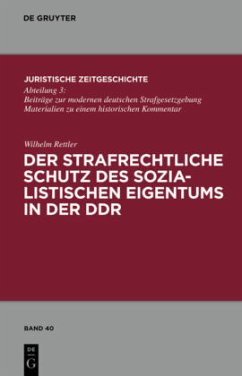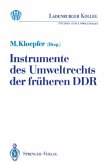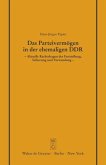This book contains the first complete presentation of the protection of socialist property under criminal law in the GDR. According to GDR principles, socialist property was considered to be the people's property, the property of socialist cooperatives and the property of their parties and popular organizations. The author describes an increased liberalization and also depolitization of the practice of criminal law in this area. The final chapter discusses if and to what extent criminal law in the GDR used to protect socialist property was, in fact, an unjust criminal law.
Das Buch enthält die erste vollständige Darstellung des strafrechtlichen Schutzes des sozialistischen Eigentums in der DDR. Sozialistisches Eigentum war nach dem Selbstverständnis der DDR das Volkseigentum, das Eigentum sozialistischer Genossenschaften und das Eigentum ihrer Parteien und Massenorganisationen. Bereits in der SBZ, als für Angriffe gegen sozialistisches Eigentum noch das RStGB galt, begann sich eine Sonderrechtsentwicklung herauszukristallisieren, die, zunächst geprägt durch die Stalin-Ära, bei Eigentums- und Vermögensdelikten gegen das Volkseigentum härtere Strafen verlangte als bei Delikten gegen das übrige Eigentum. Bereits im Strafrechtsergänzungsgesetz von 1958 ist jedoch von einer erhöhten Schutzwürdigkeit des sozialistischen Eigentums nichts mehr zu finden und die Aufspaltung des Eigentumsschutzes im StGB erfolgte nur noch aus propagandistischen Gründen ohne sonstige strafpolitische Hintergründe. Der Verfasser konstatiert eine zunehmende Liberalisierung und auch Entpolitisierung der Strafrechtspraxis auf dem untersuchten Gebiet. Im Schlussteil wird die Frage diskutiert, ob und inwieweit das Strafrecht der DDR zum Schutze des sozialistischen Eigentums unrechtsstaatliches Strafrecht war.
Das Buch enthält die erste vollständige Darstellung des strafrechtlichen Schutzes des sozialistischen Eigentums in der DDR. Sozialistisches Eigentum war nach dem Selbstverständnis der DDR das Volkseigentum, das Eigentum sozialistischer Genossenschaften und das Eigentum ihrer Parteien und Massenorganisationen. Bereits in der SBZ, als für Angriffe gegen sozialistisches Eigentum noch das RStGB galt, begann sich eine Sonderrechtsentwicklung herauszukristallisieren, die, zunächst geprägt durch die Stalin-Ära, bei Eigentums- und Vermögensdelikten gegen das Volkseigentum härtere Strafen verlangte als bei Delikten gegen das übrige Eigentum. Bereits im Strafrechtsergänzungsgesetz von 1958 ist jedoch von einer erhöhten Schutzwürdigkeit des sozialistischen Eigentums nichts mehr zu finden und die Aufspaltung des Eigentumsschutzes im StGB erfolgte nur noch aus propagandistischen Gründen ohne sonstige strafpolitische Hintergründe. Der Verfasser konstatiert eine zunehmende Liberalisierung und auch Entpolitisierung der Strafrechtspraxis auf dem untersuchten Gebiet. Im Schlussteil wird die Frage diskutiert, ob und inwieweit das Strafrecht der DDR zum Schutze des sozialistischen Eigentums unrechtsstaatliches Strafrecht war.








